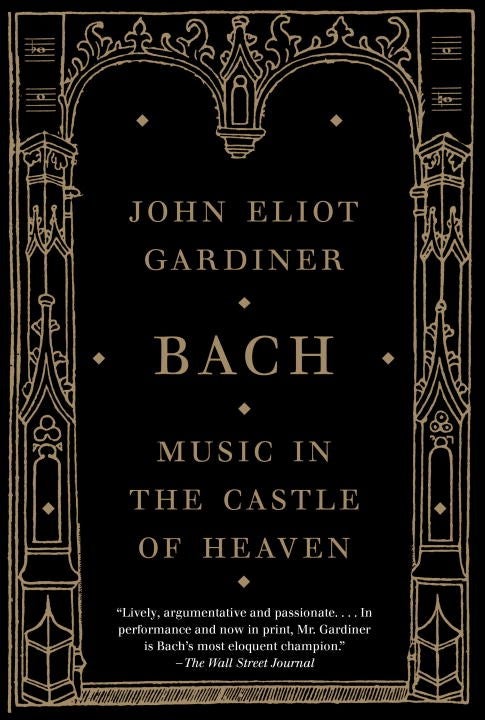John Eliot Gardiner - Music in the Castle of Heaven
John Eliot Gardiner 2013. Music in the Castle of Heaven. A portrait of Johann Sebastian Bach. London: Allen Lane, 629 pp.

Bach was born into the middle of generations of gifted musicians and composers, emerged from the desolation of Germany during the 17th century (30 year war). Orphaned at 10, moved town with 13 year old brother to live with elder brother.
(Although the book is rich with footnotes, endnotes, a chronology, glossary, map and a great index, still I wanted more: a family tree of the many Bachs who are tricky to keep track of. More significantly, it is far from a complete introduction to Bach and his music. And, there is not much about Bach’s non-choral music (missing from the index are topics like the Goldberg Variations, partita, fugue).
It was frustrating that Gardiner tells the reader that Buxtehude was the composer whose music Bach respected most (Bach got into trouble for a long absence when he travelled to Lubeck to meet and learn from Buxtehude), yet there is almost no musical discussion of what in Buxtehude’s work impressed Bach.
The early chapters - chapter 3 The Bach Gene; chapter 4 The Class of ‘85 - are a survey of JS Bach’s musical contemporarys. In particular the class: Domenico Scarlatti, Johann Sebastian Bach and George Frideric Handel (all born 1685). In particular chapter 4 one to return to when I’ve learned more; it captures the big names including Monteverdi, Rameau and others unknown to me. Gently places Telemann in a corner for not-very-special-composers, but perhaps tries a bit hard to excuse, then celebrate the failure of opera to take off in England.
[re Witch of Endor] Purcell channels the full force unleashed by the discovery of ‘opera’ in the 1600s and sums up his refusal, and that of a select body of other compsers, to be tied down by the conventions or constraints of opera-theatre. It is in moments like these that one recognises that Monteverdi’s true heirs were not his Venetian successors, but Schutz, Charpentier and Purcell.
A bit of an odd argument, at least one that I don’t yet get, given that the author and nearly everyone else credits Monteverdi as the ‘inventor’ of opera. It seems that for purists like Bach, Purcell and John Eliot Gardiner, the showmanship of opera is a bit below them? Too Broadway? I’ll have to reread that chapter, indeed the whole book. Piecemeal though. Among many other things it is a handbook to the music, especially the choral music of JS Bach and needs to be handy when listening.
The chapter Bach at his workbench has tantalising glimpses (documentary evidence is so scarce) of Bach composing, apparently speedily and sometimes/often straight to final manuscript for copyists.
But the heart of the book, is the detailed accounts from a great conductor of the choral works, especially cantatas, passions and the incomparable B minor Mass. These are listening guides to which I will return frequently.


